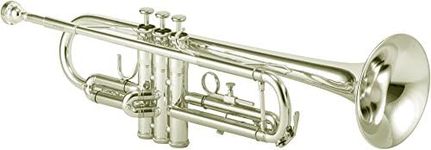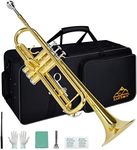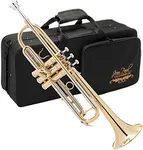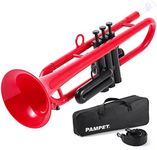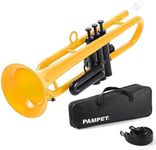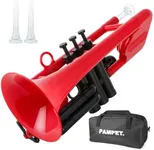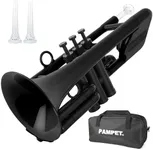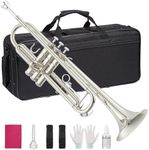Buying Guide for the Best Trumpets For Beginners
Choosing the right trumpet for a beginner can be a rewarding experience. The right instrument can make learning easier and more enjoyable. When selecting a trumpet, it's important to consider several key specifications that will impact the playability, sound quality, and overall experience for a new player. Understanding these specs will help you make an informed decision and find the best fit for the beginner's needs.MaterialThe material of a trumpet affects its sound and durability. Most beginner trumpets are made from brass, which is a good balance of quality and affordability. Some trumpets are silver-plated or gold-plated, which can enhance the sound and appearance but are usually more expensive. For beginners, a standard brass trumpet is typically sufficient and provides a good starting point.
Bore SizeThe bore size refers to the diameter of the trumpet's tubing. It affects the ease of play and the sound produced. Smaller bore sizes (around 0.450 to 0.460 inches) are easier to play and require less air, making them ideal for beginners. Larger bore sizes (0.460 inches and above) produce a fuller sound but require more air and control, which can be challenging for new players. Beginners should start with a smaller bore size to develop their skills and build confidence.
Bell SizeThe bell size of a trumpet influences the sound projection and tone. Smaller bells (4.5 to 5 inches) produce a more focused sound, while larger bells (5 inches and above) offer a broader, more resonant tone. For beginners, a medium-sized bell (around 4.75 to 5 inches) is a good choice as it provides a balance between ease of play and sound quality.
Valve TypeTrumpets have different types of valves, with the most common being piston valves. Piston valves are generally easier to maintain and are standard on most beginner trumpets. Rotary valves are another type but are less common and more complex, making them less suitable for beginners. Ensure the valves are smooth and responsive, as this will make playing more enjoyable and less frustrating for a new player.
WeightThe weight of a trumpet can affect a beginner's comfort and endurance while playing. Lighter trumpets are easier to hold and manage, especially for younger players or those with smaller hands. Heavier trumpets can produce a richer sound but may cause fatigue more quickly. For beginners, a lighter trumpet is generally recommended to ensure they can practice comfortably for longer periods.
MouthpieceThe mouthpiece is a crucial part of the trumpet as it directly affects the player's comfort and sound production. Beginners should start with a standard mouthpiece size, such as a 7C, which is designed to be comfortable and easy to play. As the player progresses, they can experiment with different mouthpiece sizes and shapes to find what works best for their playing style and preferences.

